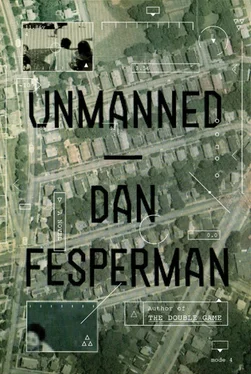Riggleman looked perfectly engineered for such duties. He was built low to the ground, a hard man to budge. Having wrestled in college, he was well versed in takedowns and escapes, the best ways to leverage bigger opponents to the mat. He knew never to loosen his grip until he was ready to employ the next move. He also knew to keep his mouth shut, especially when carrying out special assignments for his boss and wing commander, Brigadier General Mitchell Hagan.
That was the relationship that gave his talents their special potency. Hagan, a power in his own right, had a direct pipeline to Major General Salvador Shorter, whose command of the U.S. Air Force Warfare Center made him king of the mountain at Nellis Air Force Base.
Moments ago, Hagan had called Riggleman into his office. The general closed the door, shut the blinds, and instructed his secretary to hold all calls. Riggleman found it a bit theatrical, but also thrilling. Like some old scene out of film noir, he thought—Sam Spade preparing to deliver the goods to his top client. He sensed he was about to be asked to do something marginal, which meant something interesting. All that was missing was cigarette smoke, although Hagan reputedly kept a bottle of bourbon stashed in a drawer. Riggleman, wanting to maintain a military bearing, had to fight off an urge to lean forward in his chair.
“Captain,” Hagan began, “I want you to drop whatever you’re working on in order to give your full attention to a matter of the highest urgency.”
“Absolutely, sir.”
Hagan nodded, a barely perceptible gesture for a man whose head sat so low on his shoulders that it looked as if it had been mashed into place by a hydraulic press. Riggleman had always wondered what sort of opponent the general would have been on a wrestling mat. The kind who might bite in a clinch, perhaps, especially if he thought the referee wasn’t looking.
“We have a pilot who’s gone missing,” Hagan said. “We’d like you to locate him for us.”
“AWOL, sir?”
“Ex-pilot, actually. Ex–Air Force, when you get right down to it. So, not AWOL in the technical sense. But one of ours, all the same. A dishonorable discharge who was under orders, per his plea agreement, to keep us apprised of his movements. Given the sensitive nature of his previous duties, as well as his access to certain other information, we’d like to know his whereabouts as soon as possible.”
Hagan slapped onto the desk a glossy photo of a clean-shaven man in his mid-thirties with the hint of a smirk hiding just beneath a casual smile.
“Darwin Cole. You may have crossed paths when he did his Infowar training.”
“I don’t recall the name, sir.”
Hagan launched into a brief bio and slid forward a file folder. The moment Riggleman heard that Cole used to fly F-16s, his interest was piqued further. Cole was the very sort of fellow who had once lorded it over him on the flight line, back when Riggleman was a mere washout grunt. In those days, jocks ruled the clouds and everyone else got rained on. Especially the unfortunates who wore eyeglasses and carried clipboards. Yes, this was the sort of target Cole liked best. Or so he thought until he heard the rest.
“His final posting was right down the road at Creech.”
“Creech, sir?” Riggleman was stunned. “He made a combat kill in a Viper, and they assigned him to a Predator wing?”
“Yes, soldier, he was flying Predators. If that Xbox bullshit can really be called flying.”
Now the man had his pity.
When Riggleman had first heard about the drone program, he’d loved everything about it. Part of the appeal was plain old schadenfreude. It was deeply satisfying to see jocks stripped of their dreams just as abruptly as he had been stripped of his. He also appreciated the way drone technology represented the triumph of brains over reflexes, cunning over muscle. The very people who the frontline showboats had always derided as REMFs—rear echelon motherfuckers—were now the very people who were winning the war.
But the longer it went on, and the bigger it grew, the less he liked it. The pilot talent pool was being drained into banks of windowless trailers. The very thing that had once attracted him to the United States Air Force—the dash, the glamour, the whole edgy idea that every time you went up you might not come back—was being bled from the skies, pilot by pilot, and it felt like each of them was a lesser man for it.
“Creech was where Cole crashed and burned,” Hagan continued. “Figuratively speaking, of course. Little more than a year ago.” The general skimmed the particulars of Cole’s court-martial. “The full transcript is available, but it’s under lock and key, so you’ll have to file an official request. All you need to know for the moment is that, following his discharge, Cole moved to a trailer in a uninhabited sector about halfway between here and Creech. Goddamn road isn’t even marked on a map.”
He slid a glossy photo across the desktop, a shot of Cole’s trailer taken from ground level with a long lens. It looked like something from an old black-and-white film about a down-and-outer who’d turned to crime.
“No car, as you can see. No electricity, no cell phone. Not much of anything out there but empty bottles of Jeremiah Weed. Maybe that explains why they took their eyes off him. In any case, sometime before last weekend, the former Captain Cole seems to have up and disappeared. At first there was speculation he might have just wandered off into the desert to die, but a thorough search of the area has dispelled those hopes.”
Hopes? They wanted that to happen?
“Then this image turned up from last Thursday.”
He tossed another photo Riggleman’s way. It was also a shot of the trailer, but taken from high above. A dark compact sedan was parked nearby.
“The tags aren’t legible, but we suspect it’s a rental, so I suppose that’s a sort of lead already.”
“Is this from satellite surveillance, sir?”
“No. We used our own hardware.”
“A Predator? But wouldn’t that site be outside of—?”
“Draw your own conclusions, soldier.”
Riggleman already had. Someone was flying a drone beyond the proscribed limits, and they’d compounded the crime by taking photos. He knew better than to ask what sort of secrets Cole was harboring. Besides, he had his own ways of checking on such things. He would put in a few calls—discreetly, of course—then cover his tracks. That’s one thing people like General Hagan always failed to realize about people like Riggleman. Tell them to find out one thing and they were almost certainly going to find out other things as well, including stuff you didn’t want them to know. Given Cole’s key role in classified ops abroad, the possibilities seemed limitless, all the way up to espionage. A little spot on Riggleman’s spine began to tingle. He picked up the surveillance photo.
“May I keep this, sir?”
“You can keep the whole damn dossier once we’re done here, soldier.”
“Thank you, sir.”
“During his posting to Creech, Cole lived in Summerlin with his wife and two children.” Hagan tossed out yet another photo. Nice house in the ’burbs, nothing spectacular. The wife must have been a gardener, judging by all the flowers. “His wife is estranged. Two months before his release she took both their children to her parents’ house in Saginaw, Michigan.” Three more photos hit the desktop in succession, like cards in a hand of draw poker.
Cute children. Attractive woman. Riggleman’s hopes went into a nosedive. Maybe this was nothing but a domestic incident that had gotten out of hand, and Hagan was only worried about bad PR. There had been some recent stories in the media about burnout among Predator pilots. Low-key coverage, but it had stirred enough grumbling upstairs that Air Force shrinks and chaplains had been ordered to put a lid on the topic. Maybe that was their worry with Cole. If so, then Riggleman’s job would be easy but boring.
Читать дальше












